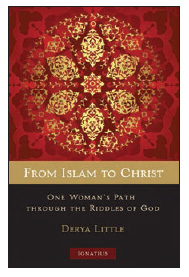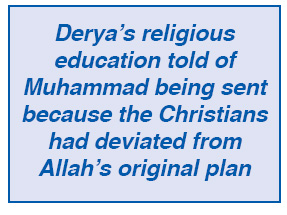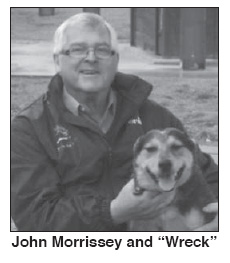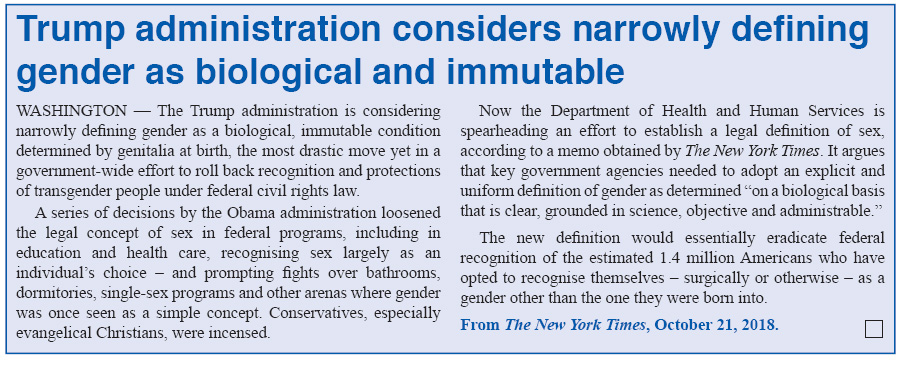From Islam to Christianity
Book review by John Morrissey
 From Islam to Christ: One Woman's Path through the Riddles of God,
by Derya Little (San Francisco: Ignatius Press, 2017). Paperback: 204 pages.
ISBN: 978-1621641124.
From Islam to Christ: One Woman's Path through the Riddles of God,
by Derya Little (San Francisco: Ignatius Press, 2017). Paperback: 204 pages.
ISBN: 978-1621641124.
Seldom have I encountered such a striking modern work devoted to a spiritual journey. This author begins her account as a 30-something years-old Christian mother of four in southwestern Pennsylvania, and takes us back to her childhood in Eregli in then moderate Muslim Turkey. Sketching a little of the history and geography of her home country, she tells us of her upbringing, her education and religious training, and the misfortunes of her family which may have contributed to her becoming a rebel.
Fatherless after her parents' separation, she tells us of her childhood, where she became precocious in every way, and of her cold and distant mother's struggle to support the family. Derya (the name is fictitious) and her brother grew up in relative poverty, wearing shabby clothes and bearing the social stigma of their father's desertion for another woman. Although excelling in her schoolwork, she secretly drank alcohol and smoked, trying drugs but disliking the effect. But it was her disillusion with Islam which marked her personality.
She came to reject a worldview based on fear, unquestioning belief and total subjection to Allah, as an unknowable God. Her religious education told of Muhammad being sent because the Christians had deviated from Allah's original plan, changed the Bible and equated Jesus with God. She recalls the distortions of Christianity which she was taught, including Christians' supposed belief in three Gods and their "blasphemy" in believing Jesus to be Son of God. This worldview was fed by Turkish films in which children saw evil Crusaders and infidel Byzantines in Ottoman times vanquished by virtuous Muslim soldiers.
Her university studies began in Istanbul, where she lived with her father and his new wife. This did not work out, resulting in her enrolling in Ankara where she found accommodation and some employment. Her studies had introduced her to British and French culture, but her only exposure to that of the U.S. had been through movies like Knight Rider and Back to the Future. It was then that she commenced work for Therese, an American looking for a Turkish language tutor.
Derya freely admits her own self-indulgence and arrogance at the time. Until then her life in Ankara had featured sex and drunkenness, as well as work and study, and had culminated in an abortion, which began the break-up with her boyfriend, Enver. She gives a brief description of the legal, religious and social implications of abortion in Turkey.
In spite of all of the skewed information which she had heard about the alleged lies, deceptions and materialism of Christian missionaries, Derya's atheism in a sense made her more open to Therese's influence. She recalls that a verse embroidered by her would change her life forever: "And there is salvation in no-one else, for there is no other name under heaven given among men by which we must be saved" (Acts 4: 1-2).
In contrast with Therese, however, she did not believe in sin, and the need for a Saviour, but in social forces being responsible for her own miserable life and the wrongs of the world. Organised religion, government and capitalism would need to be eliminated, come the revolution. This she believed, along with all the arrogant claptrap of her milieu. "I never asked what was right," only "what I thought needed to be fixed in my family, my society, my former religion."
Her relationship with Therese and the debates which ensued taught Derya that she was out of her depth in her arrogant assurance that science had all the answers to the existence of God. "Rather than being the grounds for atheism, could not the discoveries of science point towards a Creator, who values life and therefore designed the conditions for its existence?" As with the joy of beauty in nature, could this not be "attributed to God's generosity"?
Therese and husband Francis, whom she regarded as God's greatest gift to her, were the first functional family Derya had got
to know. They were both strict and loving with their children,
setting the boundaries within which children thrive. As she puts
it, "Slowly Christ's light on this loving family became clear to
me."
greatest gift to her, were the first functional family Derya had got
to know. They were both strict and loving with their children,
setting the boundaries within which children thrive. As she puts
it, "Slowly Christ's light on this loving family became clear to
me."
While this was happening, Derya came to live together with another gentle boyfriend, Alpa, and again became pregnant. Another abortion followed. She had discussed with Therese birth control and abortion, asserting their necessity for women to be free from the tyranny of men, and outwardly was still her cynical and sarcastic self. Inwardly she was changing and actually became pro-life before she developed a rational belief in God.
However, a stumbling block remained, in how an omnipotent and omniscient God allows pain to exist - which means that she had removed the "sinful nature of man from the equation", to make God - if He exists - the "ultimate perpetrator of evil".
Her answer came in her study of Dostoyevsky's The Brothers Karamazov, where Ivan rejects God for allowing too much suffering in the world, but Aloysha reveals that suffering in the world is our doing, since the Fall. "When God gave us free will, He knew that our freedom would cost Him. In His infinite love and mercy, rather than enslaving us, the Son of God preferred to die to save us from the pit we dug for ourselves."
A further stumbling block became the consequences of conversion to Christianity - apostasy in a Muslim country. Although her friends were atheists or agnostics, this would have social consequences too.
After Therese had left Ankara, Derya found work teaching Turkish to the children of another American family. Jerome and Martha showed her devotion to each other and their children in a more striking way. Jerome was unlike the typical Turkish husband or the American slob of the sit-coms, in that he was caring and respectful, not expecting Martha to serve him, but serving and supporting her in every way. Martha reciprocated with love and respect, without manipulation, praising him too in public and serving others as well.
When Derya accepted Jesus Christ as her personal Lord and Saviour, she was born again as an Evangelical Protestant in a Baptism by full immersion. Joining a group of Turkish Christians, she immersed herself in Bible study, giving up her old ways and gradually moving away from Alp, by now her fiance, as she could not spend her life with someone who did not share her beliefs. On Jerome's advice, she prayed for her parents and was reconciled with them on the occasion of her graduation, her conversion to Christianity notwithstanding.
Further study led to dissatisfaction with the simple theology of her Evangelical faith and its folksy liturgy. With many misgivings about what she was giving up in her ministries and friendships, Derya sought out an elderly French Jesuit priest. Under his wise and calming influence, she continued to read and pray, and was particularly taken by the story of the woman who washed Christ's feet with her tears (Luke 7: 37-38).
She attended Mass and the effect was profound. Although she had been hoping to find fault, the silent reverence at the Eucharistic Prayer seemed so much more fitting than the "hanging out with our pal Jesus", which she had experienced in her Protestant life. Her account of her conversion concludes with a reflection on the Real Presence, its centrality for Catholicism, and a consideration of Eucharistic miracles.
A scholarship to study for a doctorate at Durham University followed, and in Holy Week 2008 Derya was received into the Catholic Church. Although she was aware that the rite of adult Baptism cleansed her from sin, she insisted on making a First Confession, where she confessed, "I killed my own babies," because she needed to hear the words of absolution and feel at peace spiritually.
When approaching her thirties and what seemed a lonely life, a website, CatholicMatch.com, found Derya a U.S. serviceman named Virgil, and their long distance romance concludes this story. Meeting face to face, they experienced love at first sight, and marriage followed in due course.
Coming to America presented the couple a new freedom and a new loneliness, settling into a small coal town. Derya reflects on her experiences in assimilating into her American life, and accepts Christ's will that "hands-on mothering work was far more valuable to Him" than intellectual work. This young Turkish convert embarked on her spiritual life as an American Catholic with few illusions, however. She acknowledges a great debt to her Protestant friends, and regrets the Catholic laity's lack of zeal for missionary activism which she had found among them. A few years ago she was apprehensive about the then upcoming 2016 Synod on the Family.
Regarding Islamic immigration, she questions why someone brought up in a community with black-and-white rules and the security of knowing one's place in the world would want to assimilate into a society where moral relativism reigned and there was nothing beyond the material. "Assimilate to what?" she asks.
She contrasts this to the Europe which had turned back the Ottomans at Vienna and Lepanto, although riven with sin
and division, for Christ was still the acknowledged Lord of
Christendom. "Christian people stood not only against the
enemy... but for their cherished faith. They will need to do that
again."
the Ottomans at Vienna and Lepanto, although riven with sin
and division, for Christ was still the acknowledged Lord of
Christendom. "Christian people stood not only against the
enemy... but for their cherished faith. They will need to do that
again."
This amazing writer's final words of advice to her readers are simple:-
1) Learn the Faith: Feeding the mind the right food affects every aspect of life.
2) Pray, pray, pray: Then, of course, pray more.
3) Tithe: Amazing blessings... come from sharing a little bit of what God has given us.
4) Be a living thing: We Christians are living things because of our life in Christ.
John Morrissey is a
retired secondary school
teacher who has taught in
government, independent
and Catholic schools. He
lives in the Melbourne
suburb of Hawthorn with his
dog "Wreck".
![]()

